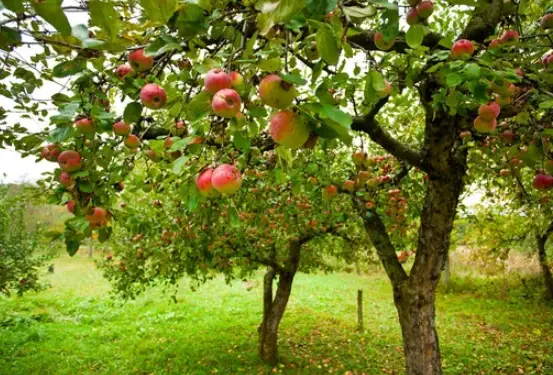Fruit trees are an excellent addition to any family’s yard, providing numerous benefits for both individuals and the community as a whole.
Not only do fruit trees offer a fresh source of nutritious food, but they also improve the environment, increase property value, and provide opportunities for social interaction and education.
In this blog post, we will explore the various benefits of planting fruit trees for families, including nutritional benefits, environmental benefits, financial benefits, and social benefits.
Also, we will provide tips for planting and maintaining fruit trees, so you can make the most of your investment.
Whether you’re a seasoned gardener or just starting out, this guide will help you understand the valuable role that fruit trees can play in your family’s life.

Nutritional Benefits Of Planting Your Own Fruit Trees
One of the most significant benefits of planting fruit trees for families is access to fresh, nutritious fruit. By growing your own fruit, you can be sure that the food you’re eating is not only delicious but also healthy.
Fresh fruit for a healthy diet
Fresh fruit is an important component of a healthy diet, as it provides essential vitamins and minerals, fiber, and antioxidants. By growing your own fruit, you can also reduce your carbon footprint and support sustainable agriculture.
Reduction in food costs
Another advantage of planting fruit trees is that they can help reduce food costs. Fresh produce can be expensive, especially when it’s out of season. By growing your own fruit, you can save money on groceries and have access to fresh fruit all year round.
Access to seasonal fruits
Planting fruit trees allows families to try new types of fruit that may not be readily available in grocery stores. This can be a fun and exciting experience for children and adults alike, as well as an opportunity to broaden your culinary horizons.
Environmental Benefits

Planting fruit trees also has a positive impact on the environment. Here are some of the environmental benefits that come with growing fruit trees:
Reduction of carbon footprint:
Growing your own fruit trees can help reduce your carbon footprint by reducing the amount of transportation required to bring fresh fruit to your table.
Provision of shade and wildlife habitat:
Fruit trees provide shade and habitat for wildlife, helping to preserve and protect local ecosystems.
Soil improvement and erosion control:
Fruit trees can also improve soil quality and help control erosion by retaining moisture and providing a deep root system.
Air purification:
Fruit trees also play a role in air purification by removing carbon dioxide and other pollutants from the air and producing oxygen.
Nonetheless, by planting fruit trees, families can make a positive impact on the environment and contribute to a more sustainable future. These benefits not only improve local ecosystems but also help to preserve the planet for future generations.
Financial Benefits Your own Fruit Trees in the Yard
Planting fruit trees can also provide financial benefits for families. Some of the key financial benefits of planting fruit trees include:
Increased property value:
Fruit trees can increase the value of your property, as they provide not only a source of fresh fruit but also a visually appealing landscape.
Possibility of selling excess fruit:
If you grow more fruit than your family can consume, you may be able to sell your excess fruit at local farmers’ markets or to neighbors, generating additional income.
Savings on grocery bills:
As mentioned earlier, growing your own fruit can help reduce the cost of food by providing a fresh, healthy source of produce.
Low maintenance costs:
Unlike many other landscaping elements, fruit trees require relatively low maintenance once they are established.
In short, the financial benefits of planting fruit trees for families include increased property value, the possibility of selling excess fruit, savings on grocery bills, and low maintenance costs. These benefits make fruit trees an excellent investment for families looking to improve their financial well-being and grow their assets.
Social Benefits of Planting Fruit Trees
Planting fruit trees can also provide social benefits for families and communities. Some of the key social benefits include:
Community involvement and education:
Planting fruit trees can bring families and communities together, as neighbors can collaborate on planting and maintenance efforts and share the benefits of the fruit.
Opportunities for family bonding:
fruit trees can provide opportunities for families to bond, as they work together to plant and care for the trees.
Building a legacy:
Planting fruit trees can also be a way for families to build a legacy, as the trees will continue to bear fruit for generations to come.
By planting fruit trees, families can foster social connections, engage in community activities, and leave a lasting legacy for future generations. These benefits help to create strong, vibrant communities and contribute to a sense of social well-being.
Tips for Planting Fruit Trees

Planting fruit trees can be a fun and rewarding experience for families, but it’s important to do it right to ensure the trees thrive and produce healthy fruit. Here are some helpful tips to you get started with:
Choose the right tree for your location:
Consider factors such as the climate, soil type, and the amount of sunlight your yard receives when selecting a fruit tree.
Plant at the right time:
The best time to plant a fruit tree is in the fall or winter when the tree is dormant. This gives the tree time to establish roots before the growing season begins.
Choose the right location:
Select a location with well-draining soil and plenty of sunlight. Avoid planting in low-lying areas or near large trees, which can compete for resources.
Proper planting:
Dig a deep hole that is twice as wide and just as deep as the root ball of the plant. Place the tree in the hole and backfill it with soil, making sure to remove any air pockets. Water the tree thoroughly after planting.
Water and fertilize regularly:
Regular watering and fertilizing are essential for healthy tree growth. Water deeply and regularly in the first few months after planting, then gradually reduce watering frequency. Use a balanced fertilizer to promote healthy growth.
Conclusion
planting fruit trees is a valuable investment for families.
Not only do fruit trees provide a source of nutritious food, but they also offer environmental, financial, and social benefits. From reducing carbon footprint and improving soil quality to increasing property value and fostering community connections, fruit trees are a smart and rewarding choice for families.
A few simple tips for planting and care, families can enjoy the many benefits of growing their own fruit for years to come.
Whether you’re an experienced gardener or just starting out, planting fruit trees is an easy and rewarding way to improve the health and well-being of your family and your community.




